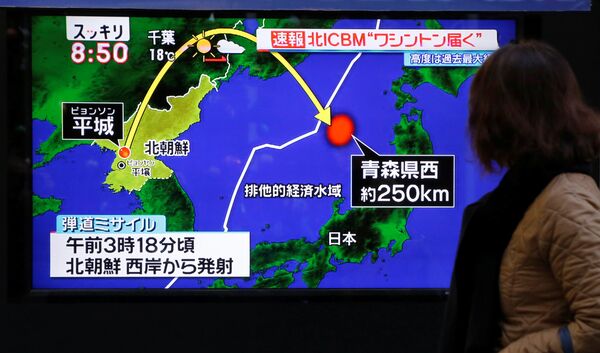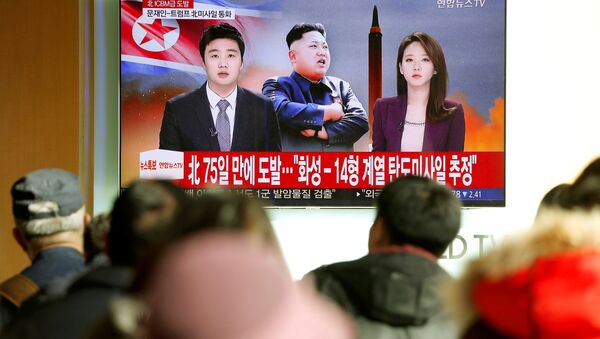Pyongyang conducted its latest missile test on Tuesday, following a two-and-a-half month lull in its nuclear and missile testing regimen. North Korean leader Kim Jong-un called the test of the new ultra long-range weapon a "historic success" on the path to "completing the state's nuclear armament." Condemned by the international community, including Russia, Pyongyang insisted that its nuclear program was meant to deter only one country: the United States. In Washington, President Trump vowed to "take care of" the problem. Minutes after North Korea made the launch, South Korea responded by carrying out testing of its own missile arsenal.
Speaking to Sputnik, Dr. Tong, an expert at the Nuclear Policy Program at Carnegie's Tsinghua Center for Global Policy in Beijing, outlined why North Korea's achievements on the path to creating a viable nuclear missile capability could become a powerful argument pushing Washington into talks on ending the regional crisis.
"This new Hwasong-15 ICBM appears to represent a further improvement in DPRK's ballistic missile capability, potentially including the entire continental United States within its range," the analyst said. "As the DPRK stated very clearly recently, their nuclear weapons are only meant to retaliate against the United States, and are not aimed at anyone else. So, yes, it is part of their response to the perceived U.S. threat."
According to the expert, this "could mean that DPRK thinks it has achieved all the basic technical capabilities of a credible nuclear force and therefore no major missile tests are needed anymore. If this is the case, this could potentially open a window to de-escalate tension in the near-term future and may increase the chances of diplomatic engagement with North Korea" (on Washington's part).
"Their lack of missile launch activity over the past two months and their test today could be more driven by technical reasons rather than political reasons. They have an incentive to complete their development as soon as possible. So I think they did the test today because they just built a new missile," the analyst concluded.

For his part, Su Hao, a professor at Beijing's China Foreign Affairs University, said that it may be too early to conclude that Pyongyang has successfully completed work on its long-range missiles.
"Whether or not the DPRK really has completed all the steps in building its nuclear missile system is difficult to say…There have been no precise confirmations on this, nor on the claim that these missiles can reach their stated targets," the academic noted.
"Still, what is obvious is that this really is a ballistic with a broader range," Su stressed. "Its development shows that Pyongyang now has the strategic capability to inflict a powerful blow [against its adversaries]. Now, Pyongyang has a powerful trump card against the United States. It would really like for the US to guarantee it a certain degree of security."
"The range of the missile is about 4,000 km, and there is no evidence that North Korea is capable of launching a missile 10,000 km" (the range capability required to really reach anywhere in the continental United States). "The US would not allow North Korea to have the capability to surprise them. I don't think that the DPRK has reached this level. Otherwise, it would prove a strategic challenge for the United States," Su concluded.



